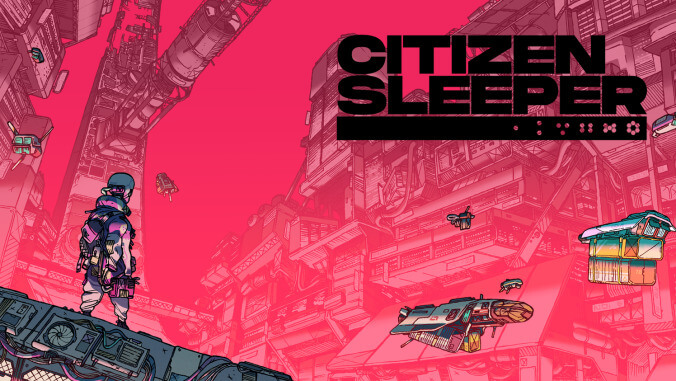Citizen Sleeper's dice rolls are even more brutal than its capitalist future hellscape
Jump Over The Age's new sci-fi RPG brings a beautiful, painful element of chance to players' Blade Runner-esque existence

Every Friday, A.V. Club staffers kick off our weekly open thread for the discussion of gaming plans and recent gaming glories, but of course, the real action is down in the comments, where we invite you to answer our eternal question: What Are You Playing This Weekend?
Don’t take this as a review of Citizen Sleeper, the new(-ish) sci-fi role-playing game from developer Jump Over The Age; as I send this to my editors, I’ve only spent about two hours with the game, total, nowhere near what I’d need to pass any real judgment on it. During that brief period, I awoke from the aftermath of a daring corporate prison break, got briefly tortured by some jumped-up space-age mall cops, got accosted by a hunter-killer AI with tentacles for a head and digital murder on its mind, and then found out that my shitty, corps-designed artificial body had been programmed with deliberate “planned obsolescence” by my former owners, leaving me with only a handful of days to live.
It was an eventful 120 minutes, to say the least.
And while that meager slice of the game’s intended experience leaves me without the wherewithal to formally review Citizen Sleeper—which has been sitting in my backlog for a few weeks now, to my own discredit—it does give me license to talk about the element of the game that has been dominating my thinking ever since my first, brief brush with it. I.e., those dice!
This isn’t to give short shrift to any of the other things that are great about Citizen Sleeper, mind you; I’m a sucker for any sci-fi world where the tools for maintaining a capitalistic hellscape have evolved right alongside (or patently outstripped) more benign advancements, and the game’s characters all seem richly written and intriguing. It’s just that it’s the dice my thoughts return to. Those bastard, beautiful dice.
See, anything serious you do in Citizen Sleeper is going to involve spending those dice, which you roll at the start of every day, keeping in reserve until you need to salvage a spaceship for easy cash, or maybe try to pilfer some space station plans to give yourself a better lay of the land. If you roll a bunch of 6’s, you’re going to have a good day—since dropping a 6 into a task’s dice holder ensures that whatever you do is going to produce a positive outcome. (At least, as long as you’re not doing something that’s super far outside your character’s skillset, which will knock that perfect 6 down to a merely very good 5.)
It’s much more likely, though, that you’re going to get a mix of low and high numbers when you wake up in the morning, which means you’re going to need to think very carefully about where you’re going to spend them. A 3 or a 4 gives you chances of a good, bad, or neutral outcome (weighted toward the neutral), which means you can probably toss it at that “Risky”-rated salvage job and come out with your artificial limbs intact. But a 1 means you’re never going to do better than “fine”—and are just as likely to get an outright bad result that hurts you or loses you money, pushing you closer to the edge of starvation in the game’s unforgiving world. And since you can’t end the day without spending all your dice, you’ll need to find something you’re okay with sucking at before you can hit the space-hay.
It’s those mandatory screw-ups that give Citizen Sleeper the authentic tabletop RPG feeling I adore, evoking memories of awful rolls I’ve had while playing games like Dungeon World that made something bad happen—which was also, inevitably, something interesting. That’s why we roll dice, after all: To acknowledge that, for all the preparation and planning and character building, blah blah blah, that we do as gamers, sometimes we do something and it just … doesn’t go great. Goes bad, in fact. Goes “Oh shit, I just got caught lifting these plans and now this rent-a-cop is threatening to crack my skull open” bad.
“Failing forward,” the tabletop principle that says failures are just as interesting and rewarding as successes, is one of those ideas that is very hard to import to video games, where players have both an enormous ability, and an enormous incentive, to make their lives go smoothly. Even a masterpiece like ZA/UM’s Disco Elysium—which Citizen Sleeper is clearly influenced by, and which ably uses its dice-based skill system to replicate your bumbling detective’s various inevitable fuck-ups—sometimes falls prey to players’ urges to game their skills to get the best possible outcome. (DE players: Yes, I reloaded my save when the tribunal went south for me; yes, I’d do it again.) But by making figuring out what to do with those crappy dice rolls a natural part of the gameplay, Citizen Sleeper embraces the idea that sometimes you’re just going to screw up. You’re going to have crappy days, where all you do is break stuff. You’re going to fail.
It’s a nasty feeling. A claustrophobic feeling. A grim feeling. And it’s also why the game has lodged in my head ever since I first picked it up, when so many other games have slipped right through the cracks.